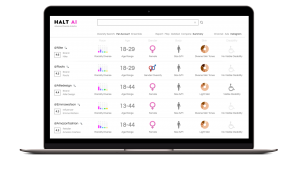A University of Toronto (UofT) spinout project has launched a new tool to measure diversity across online media.
Toronto-based Halt AI’s diversity analytics dashboard is designed to get a quick summary of companies’ diversity across their visual content. It analyzes every social media account from an entire industry and reports the amount of diversity in images using six categories: race, age, gender, body type, skin-tone, and disability.
Initially a project at UofT for measuring artificial intelligence (AI) bias, Halt AI was spun out of the institution in late 2021 with its focus on diversity analytics.
“People attach themselves to the idea of diversity, without actually … understanding what it is or accounting for the different aspects of it.”
– Amanda Cosco
Co–founder and chief marketing officer Amanda Cosco (a former BetaKit contributor) said Halt AI was created around the time a former Facebook product manager and whistleblower revealed internal research about the social media site last year. Facebook’s data reportedly showed that Instagram makes teen girls feel worse about their bodies and blame the platform for anxiety, depression, and suicidal thoughts.
“We found that advertising and visual content has such a big impact in our world,” Cosco told BetaKit. “When you’re a consumer-facing company, and you have a product that lives in the world, you should be able to market it to everybody, but you also want to make sure that your advertising isn’t exclusive of communities of colour.”

Cosco and her co-founder Roya Sedigh both come from ModiFace, a beauty tech company that develops augmented reality applications for the beauty and medical industries. ModiFace’s CEO Parham Aarabi is one of Halt AI’s advisors along with James Farmer, former diversity and inclusion head at Amazon Alexa AI.
ModiFace was acquired by L’Oréal in 2018, and teamed up with Amazon in 2020 to let shoppers digitally try on makeup products available on Amazon Canada.
In keeping with ModiFace’s roots, Halt AI first tackled the fashion industry. The sector also made sense given Cosco’s background as a fashion journalist, and how clothing brands are heavily reliant on producing visual content to market their products. Halt AI’s database provides detailed analytics on over 500 fashion brands, influencers, and retailers.
As it looks to move beyond fashion and beauty, Cosco noted that Halt AI’s goal is to be able to provide benchmarking tools for different industries, such as retail, food and beverage, as well as medicine.
With Halt AI’s platform, brands are also able to track their progress in incorporating diversity and inclusion throughout the years. “A brand may have represented themselves a certain way, but then they’ve made efforts to be inclusive and you can actually measure those efforts to prove whether or not they are living up to these claims,” said Cosco.
Toronto is also home to other startups that provide diversity analytics, such as Diversio, which focuses on a company’s hiring and recruitment processes to measure its internal EDI metrics.
RELATED: Diversio secures $8.13 million CAD on journey to improve corporate diversity and inclusion
Cosco noted that most companies focused on diversity and inclusion efforts play in their hiring and recruitment space; Halt AI wants to take that to a brand level.
“People attach themselves to the idea of diversity, without actually … understanding what it is or accounting for the different aspects of it,” noted Cosco. “Our tool kind of lets them do that.”
Feature image courtesy Halt AI


